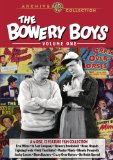| Reviews & Columns |
|
Reviews DVD TV on DVD Blu-ray 4K UHD International DVDs In Theaters Reviews by Studio Video Games Features Collector Series DVDs Easter Egg Database Interviews DVD Talk Radio Feature Articles Columns Anime Talk DVD Savant Horror DVDs The M.O.D. Squad Art House HD Talk Silent DVD
|
DVD Talk Forum |
|
|
| Resources |
|
DVD Price Search Customer Service #'s RCE Info Links |
|
Columns
|
|
|
Bowery Boys: Volume One, The
Warner Archive // Unrated // November 20, 2012
List Price: $47.99 [Buy now and save at Amazon]
The Movies:
Warner Archives has been doing an outstanding job of making lower profile films fromHollywood
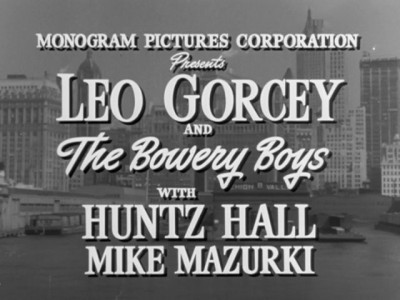
Background:
This incredibly long running series can actually trace its roots back to Broadway. In 1935 the play Dead End was a hit and Samuel Goldwyn bought the rights. He turned it into a movie that was released in 1937 and featured Sylvia Sidney, Joel McCrea, and Humphrey Bogart along with a group of kids that starred in the Broadway production, most notably (for the purposed of this review) Leo Gorcey, Huntz Hall, Bobby Jordan, and Gabriel Dell. The kids were popular and they received a spin-off series of films under the banner The Dead End Kids. (These were released by Warner who bought the actors contracts. Goldwyn reportedly didn't want to use them anymore because they were so wild on the set and caused a lot of destruction.) Not wanting to be out done, Universal started a series of street-smart kid films, The Little Tough Guys, in 1938 and recruited some of the original Dead End actors.
In 1939 Warners had tired of the series and released the actors from their contracts. Several of them were snatched up by Monogram, a low budget studio that made B-pictures, along with a couple of the actors who appeared in the Universal series. With this line-up they started releasing East Side Kids films. They'd ultimately release 21 (or 22 depending on how you count them) movies in this series lasting until 1945.
In 1945 Leo Gorcey wanted his salary doubled, and when he couldn't get it, he quit. With his costar and original Dead End Broadway actor Huntz Hall along with agent Jan Grippo he started a new production company (Jan Grippo Productions). They brought on Bobby Jordan, Leo's brother Chuck, and Little Tough Guys actor Billy Benedict as the core of The Bowery Boys. (There would be several other actors who joined and left the line-up over the years.) There were an impressive 48 Bowery Boys movies made over a 13 year period, making it the longest running feature film franchise in movie history.
The films pretty much follow a standard formula. Slip (Leo Gorcey) is the boss of a group of guys (no longer kids… Gorcey was 28 when the Bowery Boys started) who wait around Louie's Sweet Shop for something to happen, which it always does soon after the movie begins. It may be a mystery, or helping out an old pal, and it was often the result of a misunderstanding, but the guys end up investigating something and getting into a lot of trouble.
Slip is a braggart, tough, and considers himself an intellectual who tries to constantly prove how smart he is by using big word… incorrectly. Some of the best lines in the films are Slip's malapropisms. Such as when he informs Sach that he can't be seeing a ghost in Ghost Chasers: "You can't talk to someone who's dead unless they've already been reincarcerated."
Sach, the other leading character, has one outstanding characteristic and that's all he needs: he's incredibly stupid. He's so dense that in one movie the entire gang is hypnotized with the exception of Sach because, as the magician announces, he can hypnotize any intelligent creature. His ignorance is often over the top, but he actually gets most of the laughs in the series and does a great job playing the dim boob.
The rest of the cast is pretty much regulated to being very minor characters. The other "boys" don't get much screen time, often leaving on some off-screen mission while Slip and Sach play the main roles.
The humor is mainly verbal though there is some slapstick thrown in for good measure (though the slapstick does increase as the series progresses). The guys do manage some pretty funny banter, even if it's a little dated today. Lines like "You may not be an idiot, but you'll do until a real one comes along" and "I don't wanna get pharmaceutical, but you're bleedin!" are par for the course and while they didn't make my son laugh, I had a good time with them.
The films in this collection are:
Live Wires (1946): This first film in the new series has a good mixture of drama and comedy. Slip is a hard working guy, but he keeps loosing his jobs because he constantly gets into fights. His sister finds him employment with the construction company where she works as a secretary for the boss, but he even messes that up when he takes a swing at the foreman. Eventually he takes a job with his buddy Sach, serving warrants for the DA's office. He's exceedingly good at it, and eventually is given the task of tracking down a big-time criminal… little does he realize that one crook will lead to another, and he'll eventually learn that his sister is in danger.
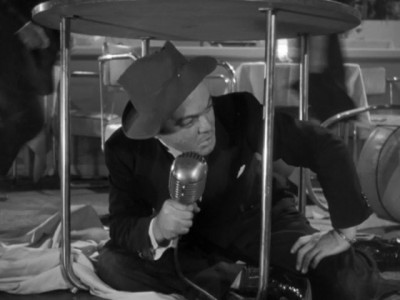
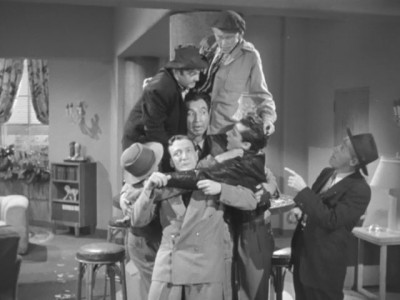
A great way to start off the series, this film was serious enough to be engaging but they added enough jokes to make it funny. The scene where Slip starts a riot in a fancy night club is hilarious (he narrates the whole thing on live radio while hiding under a table) but the overall tone of the movie isn't silly like the latter installments.
In Fast Company (1946): The garage manager of theRed Circle New York Red Circle Red Circle
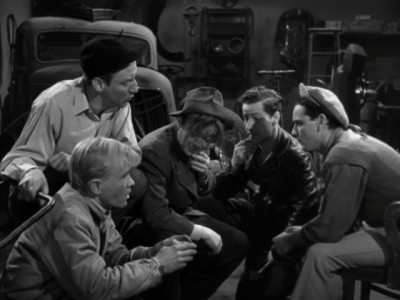
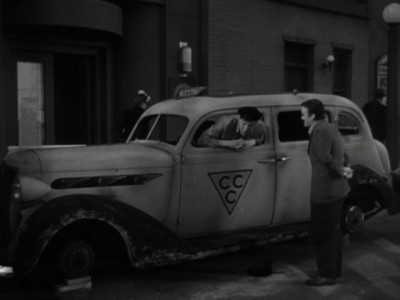
This is another very good installment of the series. The setup is fairly realistic but there are plenty of laughs to be had. The scenes where the Boys are giving it to theRed Circle
Bowery Bombshell (1946): In this outing, Sach accidently gets his picture taken while handing a bag of stolen money to a bank robber. Thinking that he's the crook, all the police in the city are looking for the dim-witted Bowery Boy and it's up to Slip and the gang to not only clear his name but find out who the real robbers are.

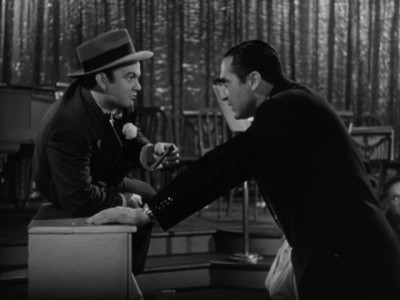
They started going for more humor in this movie, and it generally works very well. It's a funnier film than the two previous ones, but it's just a tad sillier too. The scene where Slip pretends to be a top gangster from another city is great, but the scene where they convince a thug, after drinking a scientist's potion, that he'll explode if he moves too much was a bit too wacky. Still it's a solid entry into the series. While watching, be sure to keep an eye out for Ace Deuce. He's played by Sheldon Leonard who is most recognizable as Nick the barkeeper in It's a Wonderful Life, but he also produced some of the best TV in the sixties including I Spy, The Dick Van Dyke Show, and Andy Griffith.
News Hounds (1947): This time around Slip and Sach have found employment as a copy boy and photographer (respectively) at a daily newspaper. When Slip stumbles onto a crooked crime ring that's fixing sporting events, he's sure that the scoop will get him a job as a full fledged reporter. Unfortunately, all that his story earns the paper is a fat libel suit which will ruin them unless Slip and Sach can find the proof that they need to prove that the story is on the level.
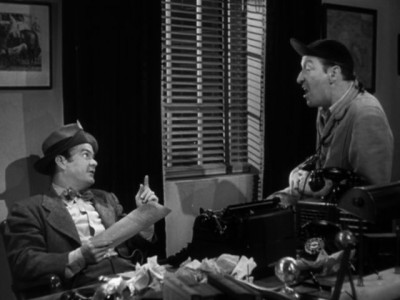
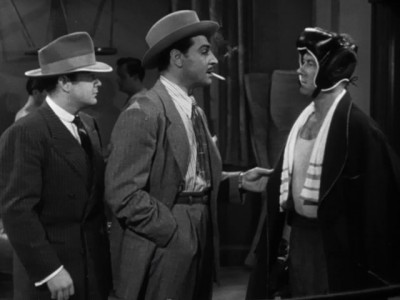
With a lot of subplots and not enough story to make the movie flow well, this is a bit of a mixed bag. Some of it is great, like when Slip dresses up as a gangster (again) and fools some crooks, but there are too many plot hole (even for a Bowery Boys) film to make it one of the better installments.
Fighting Fools (1949): This is one of the darker Bowery Boys movies, but one of the better ones too. When a friend of Slip's dies in a boxing match, the boys search for the fighter's older brother, Johnny Higgins (Frankie Darro). Johnny used to be a top boxer too, but he refused to take a dive so a group of crooks drummed him out of the ring. Now, with his brother dead, Johnny has to support his mother and kid brother and the only way he knows how is to get back into the ring. With Slip and his manager he's willing to give it a try, but the goons who arranged for his brother's death have set their sites on the up and coming boxer too.
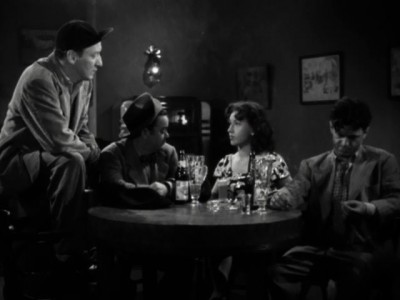
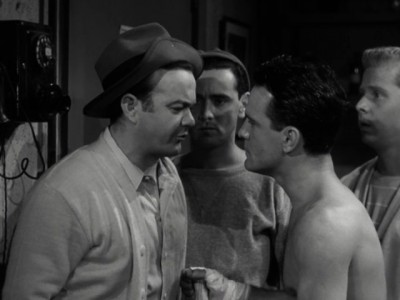
This was a more serious story for the Bowery Boys… there is murder, a child is kidnapped and threatened with death, and the villains are more nefarious than previous foils. It still has comedy, it's a Bowery Boys movie after all, but the stakes were higher and this time. It worked well and made for a very enjoyable picture.
Hold That Baby! (1949): The follow up to Fighting Fools saw the Boys go back to their tried and true formula. Slip decides that he doesn't want to be a delivery man for a dry cleaning business (especially since he was fired from the job) so he opens up a laundry business in the back of Louie's Sweet Shop. When a distraught heiress abandons her infant son in the place, the boys find themselves baby sitting and dodging mobsters who have a plan to get a large reward for the baby. Add to that a couple of scheming aunts and a visit to a mental hospital and you've got a funny, if standard film.
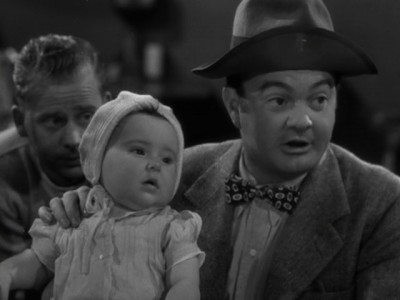
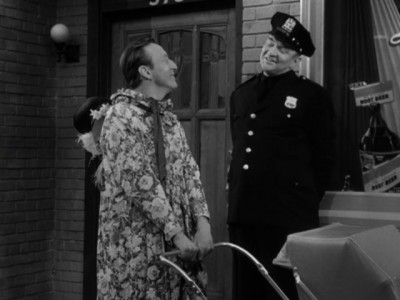
Master Minds (1949): While this film is reminiscent of other Bowery Boys films (such as Spook Busters) and doubtlessly influenced by Abbott & Costello Meet Frankenstein which was released the previous year, this movie is a lot of goofy fun. When Sach gets a toothache and every time he eats a piece of sugary candy he goes into a trance where he's able to predict the future. Slip sees a fortune in his friend's ability and tries to cash in but a mad scientist (Alan Napier) decides that Sach's brain is just what he needs for his creation (played by Glenn Strange).
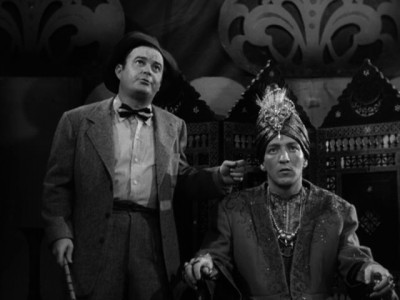
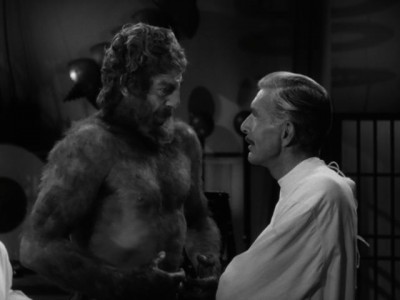
I had a lot of fun watching this film. Yes, it doesn't make sense and there are some plot holes, but it is sheer goofy enjoyment for old time monster movie fans. The highlight of the picture is Glenn Strange (who played the monster in Abbott & Costello Meet Frankenstein). He did a great job and the funniest bits are when he's imitating Huntz Hall. Pure B-movie gold.
Blonde Dynamite (1950): It's back to gangsters this time. When Slip convinces Louie to take a vacation, he and the boys turn the Sweet Shop into a male escort service with the boys acting as cultured and intelligent escorts. Meanwhile one of their pals who works at a bank, Gabriel, has been swindled out of $5000 of the bank's money by his girl. She and her real lover threaten to inform the police that Gabe is the thief if he doesn't get them the combination to the bank's vault. They then invade the Sweet Shop/ escort service as start tunneling their way to the bank… and convince Sach to do the digging too.
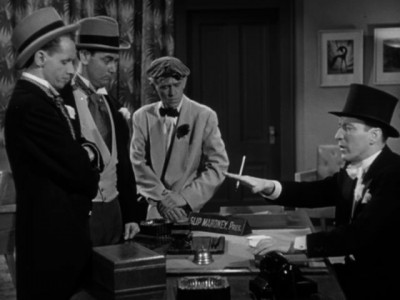
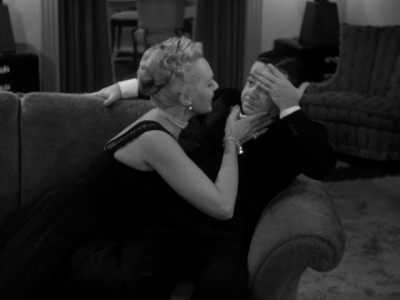
This is a decent entry in the series. Seeing the boys act as escorts was hilarious, and the rest of the story was good too.
Lucky Losers (1950): Slip and Sach try their hands at being messenger boys for a Wall Street firm in this film. When their employer is found dead, it's ruled a suicide but Slip isn't sure. Nosing around he finds some dice and a card for the High Hat Club. He decides that the club, and the illegal gambling den in the back, has something to do with the man's death and go to investigate.
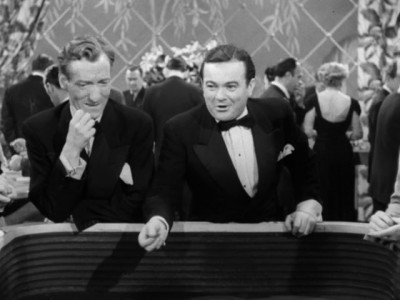
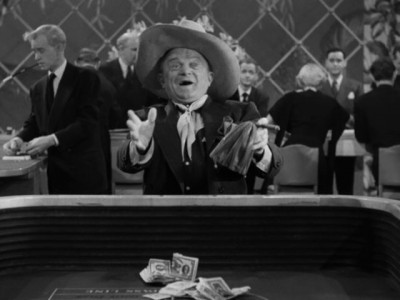
This is another average installment. It's not bad by any means and has some good moments, but nothing that makes it stand out above the other entries. The scene where the boys are learning how to gamble was entertaining, but overall just an okay film.
Blues Busters (1950): As happened in Master Mind the year before, Sach gains new (short lived) abilities in this film. After having his tonsils removed Sach discovers that he has a wonderful voice. Slip and the rest of the guys turn Louie's Sweet Shop into a night club and soon he's talk of the town. When a rival night club owner tricks Sach into signing an exclusive contract though, he can no longer appear at the "Bowery Palace
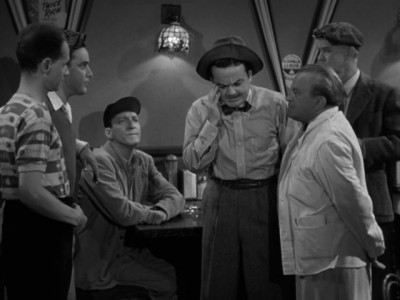
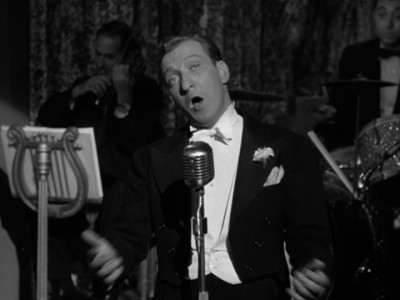
This is Gabriel Dell's last appearance in a Bowery Boys film. He had a rather odd role in the series: he usually played someone named Gabriel but it was a different character in every film. In one he's a gangster, in the next a card sharp, and later he'd be a good buddy to the Boys. It was a bit unusual, seeing all of the other Bowery Boys playing the same role film after film with the single exception of Dell. In any case his parts were getting smaller so he decided to bow out.
Crazy Over Horses (1951): When Louie is owned some money, he sends Slip and Sach to collect. Big mistake. Instead of returning with cash, they arrive with a horse, My Gal. Some gangsters want the horse though, so they switch it with another nag, Tarzana. Slip notices the swap and changes the horses back, but then the mobsters perform another switch and so on…
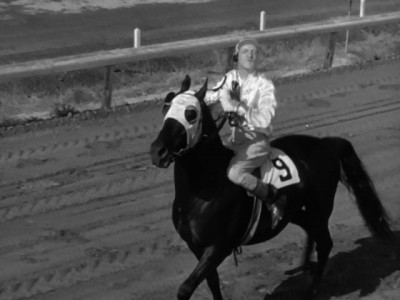
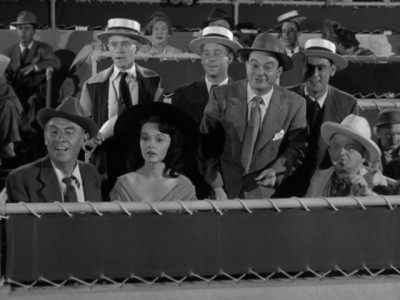
This isn't one of the beset installments in the series. It's sort of sad because there's a lot of potential with the ‘switching look-a-like horses' gag, but it felt like the actors were just going through the motions for this one.
Whitey, one of the regular Bowery Boys, makes his last appearance in this film. He said that there was a lot of in fighting and arguing going on, and that it just wasn't worth the headache any longer.
No Holds Barred (1952): Another "Sach gains powers" story, this one is pretty good, especially when compared to the previous film. After getting hit on the head with the butt of a gun and suffering no ill effects, Sach discovers that his head is super strong and Slip starts managing his wrestling career. He does well with his invulnerable noggin until… the strength of his head shifts to another part of his body. With the power unexpectedly shifting (to his finger, his elbow etc.) it's hard for Sach to know how to fight. Of course there's a gangster looking to cash in and buy Sach's contract from Slip, but we know that'll never pan out.
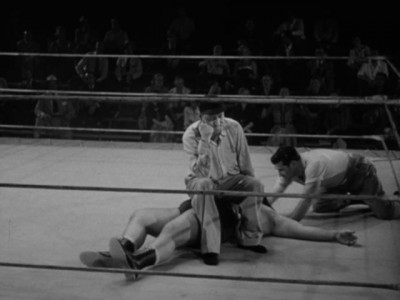
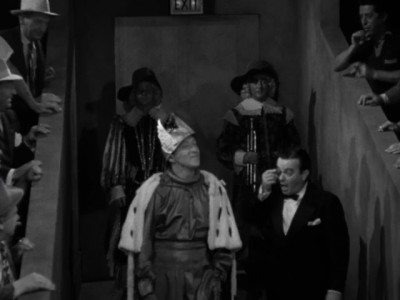
This was so bizarrely absurd that it was pretty funny. Just the idea of someone having an invulnerable head is odd, but the fact that the power travels to different parts of his body makes it hard not to laugh. It's quite a different type of movie than Live Wires that started off the collection, but very entertaining never the less.
These 12 films come on four pressed (for the initial release at least) DVDs. These are housed in a single-width quad case.
Audio:
The mono audio track is very good. The dialog is clean and clear and the background noise is minimal at worst. Fans will be pleased.
Video:
Ahh, this is what I've been waiting for. I enjoy these movies and have wanted to get solid commercial releases of them for a while. At last we get nice looking prints with great contrast and a good amount of detail. These aren't dull, scratched and hard to watch version, but on par with other Warner Archive releases, which means they're very good looking. What's more (and this is really exciting) the final two movies in this collection are presented with their original aspect ratio of 1.85:1! I never thought I'd see that happen. Bravo Warner, you've done a great job!
Extras:
None, but that's fine. There are 12 movies here and that's plenty.
Final Thoughts:
These movies weren't high art or gripping drama, but they are a great way to be entertained for an hour. If you enjoy light dramas from the 40's and 50's, these should be right up your alley. This collection features some of the better Bowery Boys films too, so it's a great place to start if you're not already familiar with the franchise. Highly Recommended.
Warner Archives has been doing an outstanding job of making lower profile films from

Background:
This incredibly long running series can actually trace its roots back to Broadway. In 1935 the play Dead End was a hit and Samuel Goldwyn bought the rights. He turned it into a movie that was released in 1937 and featured Sylvia Sidney, Joel McCrea, and Humphrey Bogart along with a group of kids that starred in the Broadway production, most notably (for the purposed of this review) Leo Gorcey, Huntz Hall, Bobby Jordan, and Gabriel Dell. The kids were popular and they received a spin-off series of films under the banner The Dead End Kids. (These were released by Warner who bought the actors contracts. Goldwyn reportedly didn't want to use them anymore because they were so wild on the set and caused a lot of destruction.) Not wanting to be out done, Universal started a series of street-smart kid films, The Little Tough Guys, in 1938 and recruited some of the original Dead End actors.
In 1939 Warners had tired of the series and released the actors from their contracts. Several of them were snatched up by Monogram, a low budget studio that made B-pictures, along with a couple of the actors who appeared in the Universal series. With this line-up they started releasing East Side Kids films. They'd ultimately release 21 (or 22 depending on how you count them) movies in this series lasting until 1945.
In 1945 Leo Gorcey wanted his salary doubled, and when he couldn't get it, he quit. With his costar and original Dead End Broadway actor Huntz Hall along with agent Jan Grippo he started a new production company (Jan Grippo Productions). They brought on Bobby Jordan, Leo's brother Chuck, and Little Tough Guys actor Billy Benedict as the core of The Bowery Boys. (There would be several other actors who joined and left the line-up over the years.) There were an impressive 48 Bowery Boys movies made over a 13 year period, making it the longest running feature film franchise in movie history.
The films pretty much follow a standard formula. Slip (Leo Gorcey) is the boss of a group of guys (no longer kids… Gorcey was 28 when the Bowery Boys started) who wait around Louie's Sweet Shop for something to happen, which it always does soon after the movie begins. It may be a mystery, or helping out an old pal, and it was often the result of a misunderstanding, but the guys end up investigating something and getting into a lot of trouble.
Slip is a braggart, tough, and considers himself an intellectual who tries to constantly prove how smart he is by using big word… incorrectly. Some of the best lines in the films are Slip's malapropisms. Such as when he informs Sach that he can't be seeing a ghost in Ghost Chasers: "You can't talk to someone who's dead unless they've already been reincarcerated."
Sach, the other leading character, has one outstanding characteristic and that's all he needs: he's incredibly stupid. He's so dense that in one movie the entire gang is hypnotized with the exception of Sach because, as the magician announces, he can hypnotize any intelligent creature. His ignorance is often over the top, but he actually gets most of the laughs in the series and does a great job playing the dim boob.
The rest of the cast is pretty much regulated to being very minor characters. The other "boys" don't get much screen time, often leaving on some off-screen mission while Slip and Sach play the main roles.
The humor is mainly verbal though there is some slapstick thrown in for good measure (though the slapstick does increase as the series progresses). The guys do manage some pretty funny banter, even if it's a little dated today. Lines like "You may not be an idiot, but you'll do until a real one comes along" and "I don't wanna get pharmaceutical, but you're bleedin!" are par for the course and while they didn't make my son laugh, I had a good time with them.
The films in this collection are:
Live Wires (1946): This first film in the new series has a good mixture of drama and comedy. Slip is a hard working guy, but he keeps loosing his jobs because he constantly gets into fights. His sister finds him employment with the construction company where she works as a secretary for the boss, but he even messes that up when he takes a swing at the foreman. Eventually he takes a job with his buddy Sach, serving warrants for the DA's office. He's exceedingly good at it, and eventually is given the task of tracking down a big-time criminal… little does he realize that one crook will lead to another, and he'll eventually learn that his sister is in danger.


A great way to start off the series, this film was serious enough to be engaging but they added enough jokes to make it funny. The scene where Slip starts a riot in a fancy night club is hilarious (he narrates the whole thing on live radio while hiding under a table) but the overall tone of the movie isn't silly like the latter installments.
In Fast Company (1946): The garage manager of the


This is another very good installment of the series. The setup is fairly realistic but there are plenty of laughs to be had. The scenes where the Boys are giving it to the
Bowery Bombshell (1946): In this outing, Sach accidently gets his picture taken while handing a bag of stolen money to a bank robber. Thinking that he's the crook, all the police in the city are looking for the dim-witted Bowery Boy and it's up to Slip and the gang to not only clear his name but find out who the real robbers are.


They started going for more humor in this movie, and it generally works very well. It's a funnier film than the two previous ones, but it's just a tad sillier too. The scene where Slip pretends to be a top gangster from another city is great, but the scene where they convince a thug, after drinking a scientist's potion, that he'll explode if he moves too much was a bit too wacky. Still it's a solid entry into the series. While watching, be sure to keep an eye out for Ace Deuce. He's played by Sheldon Leonard who is most recognizable as Nick the barkeeper in It's a Wonderful Life, but he also produced some of the best TV in the sixties including I Spy, The Dick Van Dyke Show, and Andy Griffith.
News Hounds (1947): This time around Slip and Sach have found employment as a copy boy and photographer (respectively) at a daily newspaper. When Slip stumbles onto a crooked crime ring that's fixing sporting events, he's sure that the scoop will get him a job as a full fledged reporter. Unfortunately, all that his story earns the paper is a fat libel suit which will ruin them unless Slip and Sach can find the proof that they need to prove that the story is on the level.


With a lot of subplots and not enough story to make the movie flow well, this is a bit of a mixed bag. Some of it is great, like when Slip dresses up as a gangster (again) and fools some crooks, but there are too many plot hole (even for a Bowery Boys) film to make it one of the better installments.
Fighting Fools (1949): This is one of the darker Bowery Boys movies, but one of the better ones too. When a friend of Slip's dies in a boxing match, the boys search for the fighter's older brother, Johnny Higgins (Frankie Darro). Johnny used to be a top boxer too, but he refused to take a dive so a group of crooks drummed him out of the ring. Now, with his brother dead, Johnny has to support his mother and kid brother and the only way he knows how is to get back into the ring. With Slip and his manager he's willing to give it a try, but the goons who arranged for his brother's death have set their sites on the up and coming boxer too.


This was a more serious story for the Bowery Boys… there is murder, a child is kidnapped and threatened with death, and the villains are more nefarious than previous foils. It still has comedy, it's a Bowery Boys movie after all, but the stakes were higher and this time. It worked well and made for a very enjoyable picture.
Hold That Baby! (1949): The follow up to Fighting Fools saw the Boys go back to their tried and true formula. Slip decides that he doesn't want to be a delivery man for a dry cleaning business (especially since he was fired from the job) so he opens up a laundry business in the back of Louie's Sweet Shop. When a distraught heiress abandons her infant son in the place, the boys find themselves baby sitting and dodging mobsters who have a plan to get a large reward for the baby. Add to that a couple of scheming aunts and a visit to a mental hospital and you've got a funny, if standard film.


Master Minds (1949): While this film is reminiscent of other Bowery Boys films (such as Spook Busters) and doubtlessly influenced by Abbott & Costello Meet Frankenstein which was released the previous year, this movie is a lot of goofy fun. When Sach gets a toothache and every time he eats a piece of sugary candy he goes into a trance where he's able to predict the future. Slip sees a fortune in his friend's ability and tries to cash in but a mad scientist (Alan Napier) decides that Sach's brain is just what he needs for his creation (played by Glenn Strange).


I had a lot of fun watching this film. Yes, it doesn't make sense and there are some plot holes, but it is sheer goofy enjoyment for old time monster movie fans. The highlight of the picture is Glenn Strange (who played the monster in Abbott & Costello Meet Frankenstein). He did a great job and the funniest bits are when he's imitating Huntz Hall. Pure B-movie gold.
Blonde Dynamite (1950): It's back to gangsters this time. When Slip convinces Louie to take a vacation, he and the boys turn the Sweet Shop into a male escort service with the boys acting as cultured and intelligent escorts. Meanwhile one of their pals who works at a bank, Gabriel, has been swindled out of $5000 of the bank's money by his girl. She and her real lover threaten to inform the police that Gabe is the thief if he doesn't get them the combination to the bank's vault. They then invade the Sweet Shop/ escort service as start tunneling their way to the bank… and convince Sach to do the digging too.


This is a decent entry in the series. Seeing the boys act as escorts was hilarious, and the rest of the story was good too.
Lucky Losers (1950): Slip and Sach try their hands at being messenger boys for a Wall Street firm in this film. When their employer is found dead, it's ruled a suicide but Slip isn't sure. Nosing around he finds some dice and a card for the High Hat Club. He decides that the club, and the illegal gambling den in the back, has something to do with the man's death and go to investigate.


This is another average installment. It's not bad by any means and has some good moments, but nothing that makes it stand out above the other entries. The scene where the boys are learning how to gamble was entertaining, but overall just an okay film.
Blues Busters (1950): As happened in Master Mind the year before, Sach gains new (short lived) abilities in this film. After having his tonsils removed Sach discovers that he has a wonderful voice. Slip and the rest of the guys turn Louie's Sweet Shop into a night club and soon he's talk of the town. When a rival night club owner tricks Sach into signing an exclusive contract though, he can no longer appear at the "


This is Gabriel Dell's last appearance in a Bowery Boys film. He had a rather odd role in the series: he usually played someone named Gabriel but it was a different character in every film. In one he's a gangster, in the next a card sharp, and later he'd be a good buddy to the Boys. It was a bit unusual, seeing all of the other Bowery Boys playing the same role film after film with the single exception of Dell. In any case his parts were getting smaller so he decided to bow out.
Crazy Over Horses (1951): When Louie is owned some money, he sends Slip and Sach to collect. Big mistake. Instead of returning with cash, they arrive with a horse, My Gal. Some gangsters want the horse though, so they switch it with another nag, Tarzana. Slip notices the swap and changes the horses back, but then the mobsters perform another switch and so on…


This isn't one of the beset installments in the series. It's sort of sad because there's a lot of potential with the ‘switching look-a-like horses' gag, but it felt like the actors were just going through the motions for this one.
Whitey, one of the regular Bowery Boys, makes his last appearance in this film. He said that there was a lot of in fighting and arguing going on, and that it just wasn't worth the headache any longer.
No Holds Barred (1952): Another "Sach gains powers" story, this one is pretty good, especially when compared to the previous film. After getting hit on the head with the butt of a gun and suffering no ill effects, Sach discovers that his head is super strong and Slip starts managing his wrestling career. He does well with his invulnerable noggin until… the strength of his head shifts to another part of his body. With the power unexpectedly shifting (to his finger, his elbow etc.) it's hard for Sach to know how to fight. Of course there's a gangster looking to cash in and buy Sach's contract from Slip, but we know that'll never pan out.


This was so bizarrely absurd that it was pretty funny. Just the idea of someone having an invulnerable head is odd, but the fact that the power travels to different parts of his body makes it hard not to laugh. It's quite a different type of movie than Live Wires that started off the collection, but very entertaining never the less.
The DVD:
These 12 films come on four pressed (for the initial release at least) DVDs. These are housed in a single-width quad case.
Audio:
The mono audio track is very good. The dialog is clean and clear and the background noise is minimal at worst. Fans will be pleased.
Video:
Ahh, this is what I've been waiting for. I enjoy these movies and have wanted to get solid commercial releases of them for a while. At last we get nice looking prints with great contrast and a good amount of detail. These aren't dull, scratched and hard to watch version, but on par with other Warner Archive releases, which means they're very good looking. What's more (and this is really exciting) the final two movies in this collection are presented with their original aspect ratio of 1.85:1! I never thought I'd see that happen. Bravo Warner, you've done a great job!
Extras:
None, but that's fine. There are 12 movies here and that's plenty.
Final Thoughts:
These movies weren't high art or gripping drama, but they are a great way to be entertained for an hour. If you enjoy light dramas from the 40's and 50's, these should be right up your alley. This collection features some of the better Bowery Boys films too, so it's a great place to start if you're not already familiar with the franchise. Highly Recommended.
|
| Popular Reviews |
| Sponsored Links |
|
|
| Sponsored Links |
|
|
| Release List | Reviews | Shop | Newsletter | Forum | DVD Giveaways | Blu-Ray | Advertise |
|
Copyright 2024 DVDTalk.com All Rights Reserved. Legal Info, Privacy Policy, Terms of Use,
Manage Preferences,
Your Privacy Choices | |||||||









